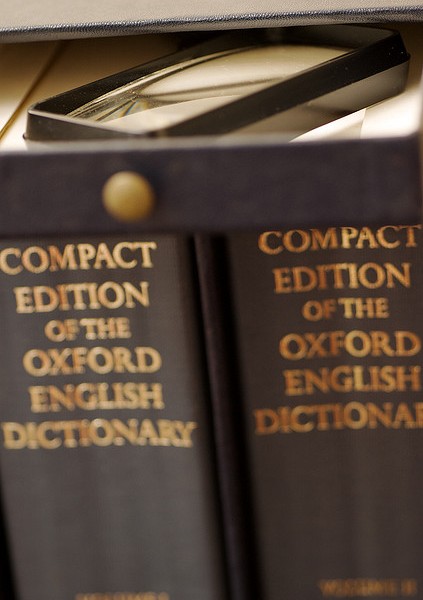At a WordPress conference this past weekend, I learned about an online service called Wordnik that brings social interaction to online dictionary use. In addition to a word of the day, a blog, and some community features, the site has a pretty snappy search engine and provides etymologies, synonyms, contexts, pronunciations, and the ability to save word lists (for example “words I’d like to use one day”). The site also aggregates tweets and Flickr images relevant to a given word, and you can comment on and tag words to add metadata of your own. I haven’t played with it much, but it looks kind of neat. If you’re a word nerd like me, maybe Wordnik will be up your alley; I’m still trying to figure out a good way to incorporate it seamlessly into my reading and writing on the web.
Poking around at the Wordnik site got me to thinking a bit about dictionaries, and I thought I’d share my dictionary tendencies and ask how you use dictionaries.
I became something of a dictionary enthusiast in college when I took a course on word origins. At the time, I used primarily an American Heritage Dictionary, though I occasionally dipped into others when I didn’t have my AHD handy. If I had a particularly interesting word I wanted to chase down, I would go to one of the libraries that housed a 20-plus volume of the Oxford English Dictionary, which is generally seen as the authority on English language lexicography. There also happens to be a fascinating book titled The Professor and the Madman that provides a glimpse into how the many citations the OED boasts were compiled, with special attention devoted to one especially colorful (and tragic) contributor.
Later in college, my parents were kind enough to give me a copy of the OED on CD-ROM. I’m old enough that the software itself actually came on and had to be run from a 3.5-inch diskette, with the CD holding the data. This put the whole of the OED at my fingertips and led me down all sorts of fun lexical paths (such as taking up a professor’s challenge to find the one-syllable word in English with the most letters).
A few years ago, I got my hands on a compact edition of the OED, two very large books that come together in a box with a drawer that holds a magnifying glass so that you can actually read the tiny print. I pull this out when I’m on a word hunt and am feeling like spending a little time with my nose in the book.
My local library system provides access to the OED online, though, and more and more, for quick lookups of words for which I want to find nuance of meaning or etymology, I’ll visit the OED online and search. The hard-copy bibliophile in me feels a little guilty about doing this.
There are of course many other kinds of dictionaries: reverse dictionaries that organize the words differently, rhyming dictionaries, dictionaries of word origins, translation dictionaries, and then fun things like Ambrose Bierce’s Devil’s Dictionary, which is actually a work of satire masquerading as a dictionary that includes entries like the following:
DICTIONARY, n. A malevolent literary device for cramping the growth of a language and making it hard and inelastic. This dictionary, however, is a most useful work.
My inner bibliophile had occasion to feel guilty again a year or so ago when I bought a Kindle, which comes with its own dictionary. I have a decent vocabulary and so can typically pick up from context more or less what a word means even if I don’t know its precise definition. When reading paper books, I all-too-often just gloss over words I’m less than familiar with, but with the Kindle, it’s easy to look up words quickly (in an ideal world, there’d maybe be a Wordnik plugin for the Kindle that would let me add a word to my list online), and so I find that while the Kindle in some ways makes me a lazier reader, it has helped me do a better job of looking up words I don’t know.
So, what dictionary do you use primarily? Do you know of any online resources that other readers of Daily Post might benefit from? Are you lazy about looking up words the way I am? If you’re a word nerd and have a favorite little-known word or word with a fun etymology, what is it?
Currently blogless? You’re a click away from sharing your story.
Create your blog at WordPress.com

Words needed. Feel free to contribute! 🙂 http://wp.me/p2kyhh-5J
LikeLike
Have you seen the Ted talk with Erin McKean, the CEO and/or Founder of Wordnik? It’s old – 2007, I think. But I loved it.
LikeLike
Another site I love is VisuWords. I did a post on it for a regular feature on my blog.
LikeLike
I gave my Dutch dictionary to my dad years ago. It was bought for school pretty much and hardly used. Online I just use English primarily, my mother tongue is just necessary since I live in the Netherlands. English though, is what I write in, I breath it, think it, dream it. Only I don’t own an English dictionary. I do own two translation dictionaries (Dutch/English and English/Dutch), but I hardly use those. Generally I just type a word in Google and go from there. I’m that lazy really. (it gets hard when you go on a writing course in England in the middle of nowhere without internet)
LikeLike